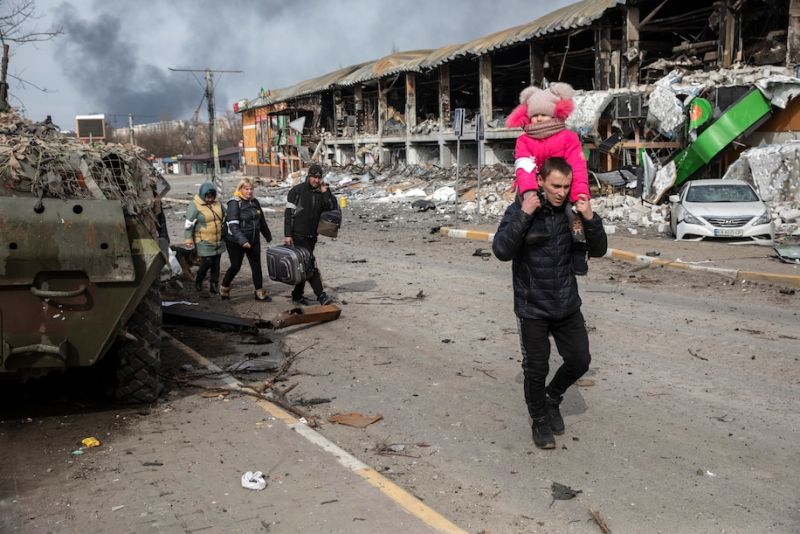
KYIV, Ukraine — I haven’t been sleeping well. Since the war began, the heat has been off in my apartment, and on Thursday night I gave the only duvet cover to my mother.
She had just been evacuated from Bucha, a town northwest of Kyiv known for its lush parks — or at least it was. Now the city is in ruins as Russian troops push to capture the capital. The shelling was so intense that my mother and her neighbors stayed in the basement of their building for almost two weeks. They had no electricity and were running very low on food and water when the Russians finally agreed to a cease-fire to let people flee.
When my mother arrived at my apartment, she could not stop trembling. I covered her with the duvet and another blanket to warm her up. She quickly fell asleep. I stayed up, listening to the shelling in the distance. Then I heard her groaning. I woke her up. “Just a bad dream”, she shrugged. “What were you dreaming about?” I asked her in the morning. She answered, reluctantly: “The Russians were torturing me”.
“It is over now”, I said. Later that day, I put her on a train out of Kyiv to safety.
In some ways, my mother is exactly the type of Ukrainian whom Vladimir Putin claims to be “liberating” from the “Nazis” that run our government.
We are from Donetsk, in the eastern Donbas region. My mother speaks Russian. But instead of the “liberation” she never asked for, the only things my mother has gotten from Russia have been pain, fear and displacement — twice. In 2014, as Russia triggered a separatist war, my mother fled Donetsk, leaving behind her apartment and her job. She relocated to Bucha, near Kyiv, to build a new life. Eight years later, Russia forced her to run away again.
When my mother was in Bucha, Russian soldiers entered her building, where they inspected apartments, checked passports and confiscated cellphone SIM cards. But my mother and her neighbors were lucky to survive that encounter — many have died in the town, fighting or brutally murdered as they tried to flee. Videos show Russians firing at civilian cars, as well as pedestrians walking through “green corridors” to safety.
The Office of the U.N. High Commissioner for Human Rights has documented 1,761 civilian casualties in Ukraine: 636 killed and 1,125 injured (From Feb. 24 to March 13). The real civilian death toll is significantly higher, Ukrainian authorities say.
Images of a mass burials are spreading online. In Bucha, almost 70 people were buried together in a deep trench.
My mother escaped that hell in one piece, but she will never forget the horrors Russia has put her through. Russia lost my Russian-speaking mother forever, the opposite of what Putin hoped to achieve with this war. And she is not the only one.
Hatred toward Russia in Ukraine has never been this uniform and deeply felt.
A former colleague from Donetsk recently wrote on Facebook: The Russians “did everything so that even those who did not consider themselves Banderites became one” — a reference to followers of the controversial Ukrainian nationalist leader Stepan Bandera. Svyatoslav Vakarchuk, one of the most popular Ukrainian singers and a former lawmaker, even wrote a poem: “Where did you come from, hatred? I didn’t wake you up at night. I didn’t offer you meals. I didn’t give you my keys”.
Even Ukrainians who once were loyal to Russia are turning their backs.
Hennadiy Trukhanov, the mayor of Odessa — who reportedly had a Russian passport at some point even though dual citizenship is not allowed in Ukraine — was a member of the Party of Regions, a pro-Russian political force led by former president Viktor Yanukovych, who fled to Russia amid the EuroMaidan revolution in Kyiv in 2014. But now Trukhanov is a patriot. He poses for photographs with a gun and says he will protect every street of his home city. He openly calls Russians “invaders” and addressed them in a video: “Who the f--- you are defending us from?”
Boxer Vasiliy Lomachenko was also seen as pro-Russian. He celebrated his victory over a Ghanaian boxer by hoisting the flag of his city, not the Ukrainian flag — and he was roundly criticized. He then posted a video about “the Orthodox spirit” that featured Russian soldiers.
Now Lomachenko’s Telegram channel is full of patriotic posts with the Ukrainian flag and “hands off Ukraine”. Lomachenko himself has joined the territorial defense of his city.
Ukrainian singers who performed and accepted awards in Russia even after it had seized Crimea and unleashed the war in Donbas are now recording videos asking to stop the war. Some are happy to see their idols speak up, but many others are calling out their hypocrisy.
If there was room for mixed loyalties and convenient vagueness before, now Ukrainians are more united than ever.
Kyiv cafes serve soldiers for free. Volunteers look after the elderly left in the city, cook for the territorial defense forces and make molotov cocktails. People share their cars to let others reach safer locations or welcome strangers in their apartments.
While waiting out another round of airstrikes on Kyiv in a shelter, I heard someone listening to a voice mail from a friend: “I will now be way more patriotic than I ever was”.
Anna Myroniuk is a journalist and the head of investigations at the Kyiv Independent.
